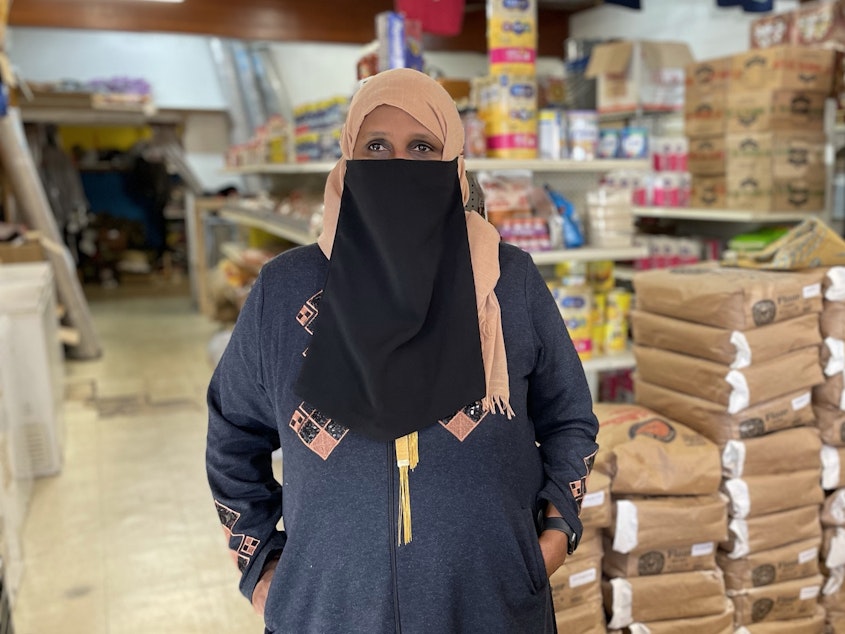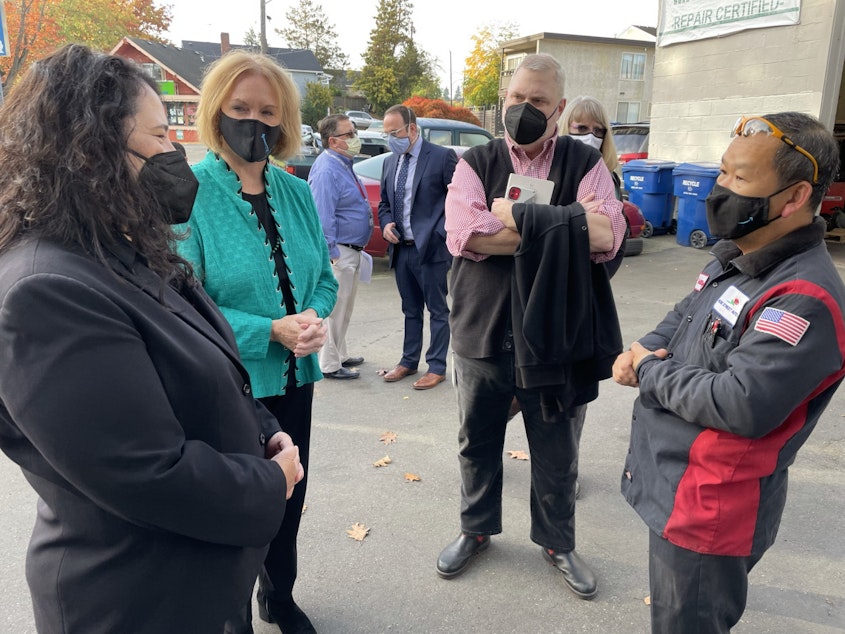This Seattle woman wants to know: How can she get those small business grants?

When politicians, including the Seattle mayor, stopped by Asha Gobana’s small grocery store in Rainier Valley this week, Gobana told them she didn’t know how to get the financial help they were touting.
“Where do I get it? How do I get it?” Gobana asked. She’s the owner of Balageru International Mart, which sells East African foods.
Four million dollars are available for businesses like hers, as Seattle takes applications for its sixth round of grants to help small business owners survive the pandemic. The money will be given in $5,000, $10,000, and $20,000 grants.
Gobana thought she had applied for grants earlier during the pandemic. She received a government loan through her bank to cover costs. Some loans like that were converted to grants and the people who took them out no longer had to pay them back.
Hers was not. Only $3,000 of $13,000 was forgiven, and she said she doesn’t understand. She worries she applied for the wrong kind of aid.
“I don’t know the system," Gobana said.
Sponsored
“So, you even need the help on how do you even navigate it?" asked Seattle Mayor Jenny Durkan.
Durkan was with Isabella Casillas Guzman, who heads the Small Business Administration for President Joe Biden.
“We are launching a navigator program so that there’s more local people who can connect with businesses like you and tell them about the programs that you can qualify for,” Guzman said.
Guzman was talking about a new program. But past efforts to try to reach business owners like Gobana haven't always worked so well.
The first round of small business loans in Seattle last year wound up going only to English-speaking business owners, according to Tammy Morales, Seattle City Councilmember.
Sponsored
When that happened, she and others called for some changes.
“One of the things we did at council was ask them not to roll out any new opportunities until things had been translated. So that was the first step: Slow it all down. I know people are eager, but we need to make sure everyone has an opportunity.”
Today, there are applications in eight different languages: English, Amharic, Chinese, Korean, Somaali, Spanish, Thai and Vietnamese.
But there’s still more to be done, said BJ Stewart of Urban Impact, a non-profit group that does outreach work.
"It really takes concerted effort from a variety of sources including those who have cultural sensitivity and the ability to translate to reach everyone," Stewart said.
Sponsored
So how is the outreach the city is doing now?
The city wasn’t able to provide numbers on short notice of how many applications it’s received in different languages.
But an online dashboard shows which neighborhoods received the most grants. The highest number of grants went downtown. Second place was south Seattle, home to some of Seattle’s most diverse ZIP codes. Behind that was Capitol Hill and the Central District.

The politicians were walking through Rainier Valley because they wanted to know how they could improve the way they distribute federal relief money.
Sponsored
That's important, because as the city opens up another round of business stabilization grants, it's tracking how equitable that distribution is.
Earlier in the day, they had visited Philip Nguyen, who owns Rose Street Auto Repair, on Rainier Avenue.
"We used to have five technicians, but now we have only two, and that's all," Nguyen told the visiting officials.
The expenses keep mounting. He pointed to a row of cars behind him. The owners had dropped off their cars and had not been able to pay. They would return with the money, he said, once they'd scraped it together.
"What were you able to do with the federal relief, the Paycheck Protection Program? How did that change things for you?" asked Guzman, the SBA administrator.
Sponsored
"Well, it does help us keep going on," Nguyen said. "We have to pay money out of pocket to pay the rent."




